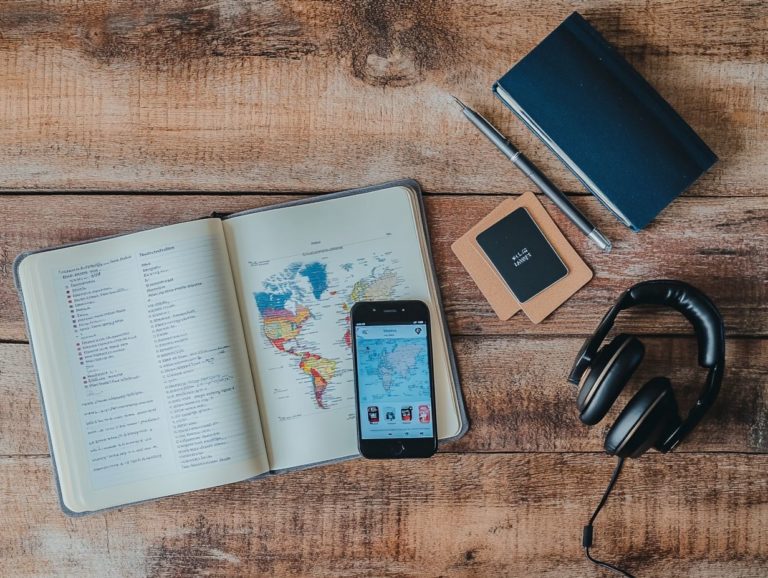the importance of listening in language learning
Listening is an essential yet frequently underestimated aspect of language learning. It not only enhances your comprehension but also significantly contributes to improving your pronunciation, vocabulary, and grammar.
You ll discover the many benefits of listening, along with effective strategies designed to elevate your listening abilities and tackle the common challenges that many language learners encounter.
By integrating practical listening exercises into your daily routine, you can revolutionize your learning experience and elevate your communication skills to new heights.
Get ready to explore the transformative power of listening in your journey to master a new language!
Contents
- Key Takeaways:
- The Role of Listening in Language Learning
- The Benefits of Listening in Language Learning
- Strategies for Effective Listening in Language Learning
- Challenges in Listening for Language Learners
- Incorporating Listening Practice into Language Learning
- Frequently Asked Questions
- What is the importance of listening in language learning?
- How does listening contribute to language learning?
- Can listening help improve language fluency?
- What are some effective techniques for improving listening skills in language learning?
- Why is it important to listen to a variety of speakers when learning a language?
- How can listening help with understanding cultural nuances in language?
Key Takeaways:

Active listening is crucial for language learners. It improves comprehension and pronunciation.
Using audio resources and implementing active listening techniques can enhance language learning.
Incorporating regular listening practice into language learning routines can help overcome common difficulties and improve overall proficiency.
The Role of Listening in Language Learning
Listening is essential in language learning, acting as a cornerstone that bolsters your communication skills, deepens your comprehension, and highlights the importance of listening in language learning, smoothing the overall journey of acquiring a new language.
For anyone diving into a foreign tongue, honing effective listening skills is paramount; it ensures you grasp spoken English and simultaneously enriches your speaking abilities by offering vital input.
In the classroom, you ll find a vibrant atmosphere where listening strategies come into play, fostering engagement and promoting reflective learning among peers.
Why Listening is Important
Listening is crucial in your journey of language acquisition, as it forms the bedrock for effective communication and comprehension. This skill helps you communicate effectively in any language.
Employing active listening techniques like summarizing, questioning, and reflecting can significantly boost your understanding and retention of new vocabulary and expressions.
For example, when you immerse yourself in conversations or engage with audio resources such as podcasts or videos, you don t just hear the pronunciation and intonation; you also grasp the context in which words are used. This kind of practice can help you overcome common hurdles, such as misinterpretation or a lack of confidence in speaking.
Creating an environment that prioritizes attentive listening enables you to express your thoughts more clearly, engage in discussions with greater effectiveness, and ultimately, enrich your language-learning experience.
The Benefits of Listening in Language Learning
Listening offers many advantages, greatly enhancing your comprehension, vocabulary, and overall language proficiency. This skill not only enriches your understanding but also enables you to communicate more effectively across diverse contexts.
Improved Comprehension and Pronunciation
Listening practice plays a pivotal role in enhancing your comprehension and pronunciation skills, allowing you to grasp the subtleties of spoken language and communicate with greater effectiveness.
By engaging in structured listening exercises, you immerse yourself in the sounds of native speakers and a rich variety of accents. This exposure sharpens your ability to understand different dialects and hones your articulation and rhythm in speech.
Such activities are essential in your learning journey, as they provide opportunities to practice real-world listening scenarios, reinforcing your vocabulary and contextual usage. Interacting with varied speech patterns builds your confidence, encouraging you to dive into conversations with ease.
These thoughtfully crafted listening tasks are key to developing a well-rounded linguistic competence.
Enhanced Vocabulary and Grammar Skills

Active listening is key to boosting your vocabulary and grammar skills. It helps you understand how sentences are built and exposes you to new words.
By engaging with various listening activities, like podcasts and audiobooks, you immerse yourself in different language contexts while discovering unfamiliar words and grammar patterns.
A podcast about travel can introduce terms related to navigation and culture. In contrast, an audiobook from a different genre may highlight unique expressions or idioms.
Using techniques like note-taking and summarizing main ideas can strengthen your understanding. Discussing content with peers also enhances your grasp of the material.
These methods help you remember new vocabulary and encourage you to practice grammar in your speech and writing, leading to a more comprehensive understanding of the language.
Strategies for Effective Listening in Language Learning
Using strategies for effective listening is crucial for achieving your learning goals. It enhances communication skills and maximizes engagement with educational resources.
This approach ensures that learners absorb information and actively participate in their educational journey.
Active Listening Techniques
Active listening techniques are essential for cultivating effective communication skills as a language learner. They help you engage deeply with content and reflect on your understanding.
By focusing intently on what s being said, you enhance comprehension and improve your ability to respond meaningfully in conversations. Techniques like paraphrasing clarify your understanding, while asking questions allows you to explore topics further.
Engaging in discussions creates a collaborative learning environment that promotes reflective thinking. These strategies stimulate critical engagement, helping you process and retain new words and grammar more effectively.
Attentive listening fosters empathy and cultural awareness, vital for mastering a new language and communicating confidently.
Utilizing Audio Resources
Utilizing a range of audio resources like podcasts, radio, and YouTube videos provides authentic language input that enhances listening skills and overall language acquisition.
By exposing yourself to native speakers in various contexts, you become skilled at recognizing different accents, slang, and cultural differences. Podcasts offer an accessible way to dive into topics that resonate with you and can be listened to at your convenience.
Radio shows deliver real-time conversations that improve your understanding.
YouTube videos come with audiovisual elements that simplify comprehension, often including subtitles to reinforce your reading skills alongside listening. When selecting content, consider your personal interests and language proficiency, starting with simpler materials to build confidence.
Incorporating these resources into your study routine, perhaps by designating specific days for audio immersion, can lead to consistent improvement.
Challenges in Listening for Language Learners
As a language learner, you may face challenges in listening that impede comprehension and hinder effective communication.
Don t let these challenges hold you back; tackle them head-on to enhance your overall language proficiency.
Start using these tips today to elevate your language learning journey!
Common Difficulties and How to Overcome Them

Common challenges in listening include deciphering various accents, keeping pace with rapid speech, and navigating complex vocabulary. These hurdles can create significant obstacles in your journey toward language learning and comprehension.
Feeling frustrated by these challenges is normal. Developing effective strategies to improve is crucial. One practical technique is engaging in active listening exercises. By focusing on audio materials at different speeds, you can gradually enhance your adaptability.
Incorporating comprehension strategies like understanding language from the smallest parts, such as sounds or words, to build meaning can also be a game changer. This approach can significantly boost your understanding.
Equally important is using your prior knowledge and context to make sense of what you hear. This technique effectively bridges the gaps created by the challenges you face.
Incorporating Listening Practice into Language Learning
Adding listening practice to your study routine can make a huge difference for honing effective communication skills. This vital component can be woven into your studies through various educational resources.
Ways to Incorporate Listening into Study Routine
Adding listening to your study routine can transform your skills! Consider dedicating time to focused listening exercises, exploring interactive media, and committing to daily practice.
By setting aside specific times for these activities, you can create a consistent habit that deepens your understanding. Mobile applications like FluentU and LingQ offer engaging ways to practice, granting you access to authentic content tailored to different proficiency levels.
Engaging in conversations with peers or language exchange partners can elevate your listening abilities. These social interactions not only make learning enjoyable but also immerse you in real-life contexts that significantly aid comprehension and retention.
Frequently Asked Questions
What is the importance of listening in language learning?
Listening is a crucial part of learning a language. It helps individuals develop their understanding and comprehension skills, necessary for effective communication in any language.
How does listening contribute to language learning?

Listening helps learners become familiar with the sounds, intonations, and rhythms of a language, making it easier for them to pronounce words correctly and improve their overall speaking skills.
Can listening help improve language fluency?
Yes! Consistent and active listening practice can significantly enhance language fluency. It helps learners recognize common phrases and expressions, as well as develop their vocabulary and grammar skills.
What are some effective techniques for improving listening skills in language learning?
Some effective techniques include listening to audio resources, such as podcasts or music, conversing with native speakers, and focusing on the speaker’s body language and facial expressions.
Why is it important to listen to a variety of speakers when learning a language?
Exposing yourself to a variety of speakers helps you become familiar with different accents and dialects. This is essential for understanding and communicating with diverse individuals in real-life situations.
How can listening help with understanding cultural nuances in language?
By actively listening to native speakers, learners can pick up on cultural nuances, such as idiomatic expressions and gestures, which are crucial for understanding and effectively using a language in its cultural context.




